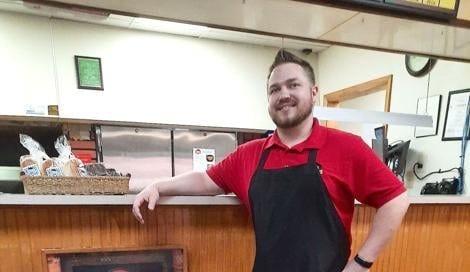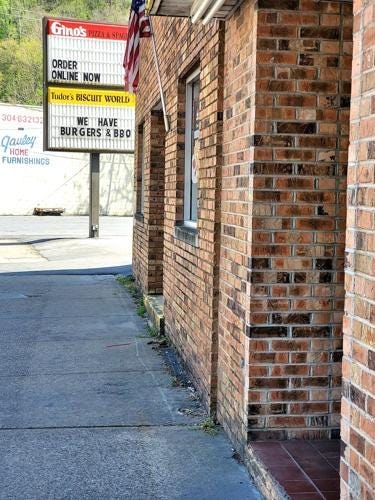Laboring under the “Nobody wants to work” narrative
Revisiting a piece I did for a local paper I'm really proud of three years later that is a little about pizza, but mostly about small towns still worth having some good work
An after church meal with my mom and dad while home for a visit turned into a piece I still love. No one wanted it, which I expected since most places don’t want 1600 words on niche pizza places in a town they’ve never heard of. That is, no one wanted it until Cheryl Keenan for the local Fayette Tribune jumped at the chance to run it. She gave me the entire back page of the A section in color, which was not normal and for someone who had been mostly an internet writer really cool. This led to me writing opinion for the Fayette Tribune for the following years until Cheryl was let go by the parent company, a story all too familiar in the print media world.
But the cool story behind the story to this is, when Cheryl went to take the pictures for the piece, the guy I profiled just happened to have his regional boss there, so it felt good for the local reporter to show up to take the pics on a piece about what a good worker he was right in front of his supervision.
Full piece as it originally ran after the pic.
Sometimes we hear things over and over again until they become the general consensus by repetition more than merit. Common knowledge truthisms take the jagged edges between the moving tectonic plates of societal change and try to explain the grinding and shaking with the simplest possible explanations. Often, they are explanations without full thought or reasoning, the way the ancients attributed the sun to the sun god, the moon to the moon god, and everything else to miscellaneous unknowable something somethings that control such things.
Economic upheaval is a complicated subject of much debate, so it is no wonder that when business after business hang out “Help Wanted” signs, coupled with endless news stories of “labor shortage,” there are going to be some factual shortcuts to get the explanation down to a soundbite. That sound bite of late is “nobody wants to work” and it has spread until it is a recited part of our current cultural and political catechism.
It was just over a year ago that a fast food joint put the sign out “We are short-staffed. Please be patient with the staff who did show up. Nobody wants to work anymore,” which showed up on a TikTok that quickly went viral, caused many copycats, and became ingrained as the truth.
“Nobody wants to work” just sounds right, easily putting the blame on “nobody,” the first cousin of the always popular “them” when it comes to assessing blame. Lazy. Entitled. Deadbeats. The list of invectives goes on from there. Think pieces, deep dives, podcasts, and specials followed, drinking deep from the draft of “nobody wants to work” to apply broadly to whatever demographic needed cajoled or blamed. Thousands of them.
This is not one of them. This is a story of someone who does work, and works hard, and not only deserves to be recognized for it, but praised as an example for countless others who do the same. Or at least in proportion to the press “nobody” is getting as of late for not working. Someone who is not trying to make a statement or change a narrative, but just putting in their work as best they can. The way it is supposed to be done, just getting on with it.
The folks in towns like Gauley Bridge are veterans at just getting on with it. The 600-odd residents still living on the side of the hills not taken by the mountain, rivers, and railroad or who call adjacent Scrabble Creek home have had to adjust to plenty. The loss of jobs and industry that plagues many places but the Kanawha River Valley especially. The ferroalloy plant at Alloy just down river that once employed thousands now pays out to only a few hundred. The surrounding mines and supporting industries that came and went and finally disappeared altogether.
The town itself lost population, then lost its high school, and now faces losing its elementary school, too. Unemployment is much higher than the national average, and those who do have a job average a 31-minute drive to get there. But “nobody wants to work” is an easier slogan from folks from other places than the nuances and trauma of slowly losing chunks of your town, in a region that is demographically bleeding to death, in a state used to things being extracted with only stereotypes and lazy analysis like “nobody wants to work” offered to the folks left behind.
So, checking to see if the Gino’s Pizza and Spaghetti House in Gauley Bridge would be open for an after-church lunch, and the ubiquitous “We’re Hiring!” coming right up, could have been a foreshadowing to another round of eating out with subpar service. At a restaurant with linen tablecloths and everything the day before, short staffing and the previous evening’s large party for a wedding or some such was the proffered reason for slow service, a list of things that were on the menu but not available (being out of lettuce because of said party was an anecdote of particular note), not particularly well prepared food, and an overall meh experience despite the server who was working hard, scurrying, apologizing, trying their best to get on with it despite being set up to fail. Such service industry employees are trying to work, but too often saddled with hard-to-impossible tasks that have a bunch of them wondering if their wages are worth the effort at all, which then gets them lumped into “nobody wants to work” instead of the more understandable and universal “I just want better.”
You could be forgiven then for skepticism of Gino’s, especially since the unchanged double sign out front still advertises the once-twinned Tudor’s Biscuit World that years ago moved down river into its own, separate place that had been built for a Wendy’s that survived for five minutes before it closed down. One wonders if it was because “Nobody wants to work” or just the average, run of the mill incompetence to run a notoriously hard and thin margined pursuit like a chain restaurant. Thus Gino’s it became, and expectations from a lifetime of patronage were met immediately.
For the uninitiated, Gino’s Pizza and Spaghetti has been a staple in southern West Virginia for decades, often paired with the aforementioned Tudor’s that handles breakfast duties before switching over for the day. The Gauley Bridge version is classic pizza joint: you order at the counter; you sit in booths or tables where your order is brought to you; there’s even a Ms. Pac-Man arcade game as God intended every true pizzeria to have.
And only one employee is working.
Not only working but working well. Crisp, polite, efficient service. Bouncing from phone, to computer screen, to tables, to the back, lather, rinse, repeat. After ordering it was a pleasure to behold, the old instincts from having been a manager and leader thinking “This is exactly the kind of employee you want to have.” Phone ringing off the hook, but dealt with. A lady comes in to pick up an order of pizzas too high to get under the Covid-19 mandated plexiglass and requiring two trips. A few more guests come in and sit down, and are told they will be served directly as our drinks and appetizer are brought out. There is a beautiful ballet to efficient work, of someone zoned into the task at hand and doing it well, problem solving on the fly, handling customer service, of just getting on with it.
The food comes, and it is exactly what it should be. Gino’s is far from haute cuisine and the dedicated pizza snobs or pasta perfectionists would no doubt find fault, but in my lifetime I’ve had far more good meals there than not. One employee, pulled a dozen directions, putting their work in, got the food right. It could have been pictures for the menu, exactly what was expected, as ordered, and not after too long of a wait. Food made with the most important ingredient of any job, any employment, any work: a large portion of give a damn. Personal integrity, or desire to do well, or wanting to keep their job, or whatever the motivation was, the job was not just done but done well. Done when there were a thousand excuses not to, and probably the ability to go viral for making a fuss about it if one wished to. Eating and enjoying, fellowshipping with the family I was with, resting for a moment before continuing the rest of a very long day all made far more enjoyable by having witnessed this, having been well served, having been treated well.
One employee busting out pizzas, pubwiches, and spaghetti on a Sunday afternoon laying bare the lazy lie of “nobody wants to work,” not with a think piece or viral video, but in the irrefutable evidence of honest labor. Of course, there are those who will not work for a variety of reasons, and there are those who take advantage of the system to not work. West Virginia, like everywhere else, has their fair share of those. But that isn’t everyone; it is not even a majority, and just because the common knowledge and general consensus shouts “nobody wants to work” in our media outlets doesn’t mean we shouldn’t push back when we see the steady everyday rhythm of those who do work, who do their best, who toil, and labor, and make a living as best they can. The seemingly endless number of media platforms should spend some time on those folks, on how to improve their lives, and opportunities, and avenues for taking their want to and applying it to sound policies that improve them, their families, and our committees. That’s a more useful expenditure of our efforts, instead of furthering the “nobody wants to work” on the nameless, faceless “them” who are always quick to blame but never pay the price for anything. That price is paid by those who do work, usually without much complaint. They don’t have time for that.
For those of us who do have the ability to write, or talk, or elevate stories, a well-made after-church lunch at the Gauley Bridge Gino’s will be a good reminder whenever stories of labor shortages roll across our social media timelines or on the news crawl on TV. That one employee taking care of dozens of customers is a worthy thing of praise. As we cleaned our own tables and took our remains to the counter, our small part to help someone who had already done enough, and made sure payment was handled and a tip went directly into the hands that had provided the service, there was just one thing I had to know before departing.
“What’s your name?”
“Jeremy White, sir,” was the reply.
As I said to him, and we all should say to all those who work, whether noticed or not, instead of constantly complaining about those who won’t: “Well done.”
Originally published at The Fayette Tribune reused with permission







